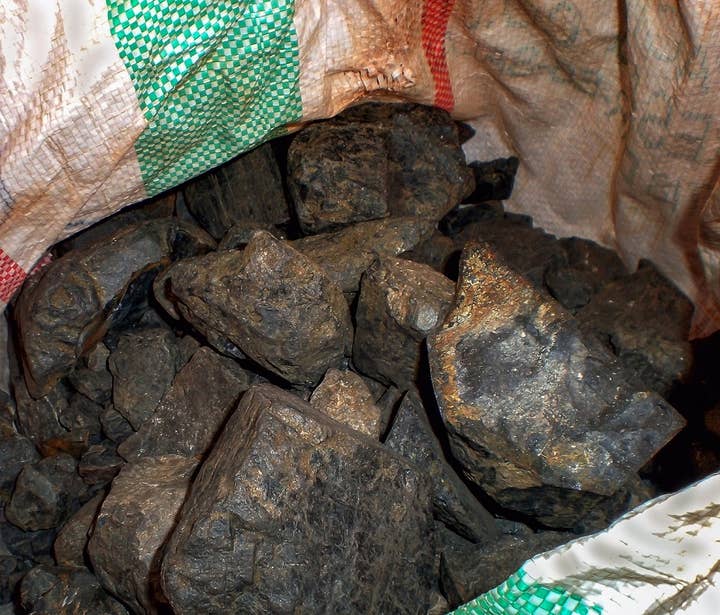Conflict minerals progress in jeopardy
The games industry has made commendable steps in its sourcing of conflict minerals, but the law that made it possible is facing repeal
Publicly traded companies across the US this week filed reports with the Securities and Exchange Commission about their use of conflict minerals. We've reported on this a few times before, but the nitty gritty of how your Skylanders collection could have helped fund war crimes can actually be pretty dry, so let's try covering this with a slightly different format than usual.
What's so bad about conflict minerals?
Tin, tungsten, tantalum, and gold (called 3TG, collectively) are frequently used in modern electronics (and jewelry, and cars, and toys...), and a considerable amount of those materials can be found in Africa's Great Lakes region, specifically the Democratic Republic of the Congo and its neighboring countries. Decades of political instability and wars in the region have seen the rise of armed factions using slave labor to mine its natural resources, which can then be sold to fund more conflict. Historically, there was no way for consumers around the world to know if their money was ultimately ending up in the pockets of those armed groups, and companies weren't exactly diligent about double-checking where their key suppliers got their raw materials from.
Which gaming companies use them?
Fortunately, gaming is increasingly a digital medium, so there are a limited number of companies that really need to worry about this - hardware manufacturers being the biggest of them. Smartphones, consoles, VR headsets, keyboards, mice, and toys-to-life products like Skylanders and amiibo all use 3TGs.
So is the games industry funding human rights abuses?
Probably not as much as it used to!
After the 2008 financial crisis, the US government passed the Dodd-Frank Act, which covered a broad assortment of financial regulations intended to prevent any such crisis in the future from turning into a catastrophe, but also included a section requiring publicly traded US companies to report annually on their supply chains for conflict minerals. (The European Union recently passed its own regulations aimed at conflict minerals, but they won't take effect until 2021.)
The first of the SEC-mandated disclosures hit in 2014, but we regrettably didn't cover them. When we first looked at the reports in 2015, we were shocked at how little these massive companies knew about their supply chains, and how many of their business partners refused to even answer the company's inquiries into where their materials came from. Thankfully, the 2016 reports showed that all the big players had made significant progress.
This year's reports have continued the trend. Microsoft had all but 1 of its 252 suppliers return its surveys, considerably improved from the 71% response rate three years ago. And through those, they found that 87% of the 303 3TG smelters or refiners (SORs) in their supply chain were validated conflict-free by the Conflict Free Sourcing Initiative (CFSI) trade group. That still needs improvement, but it's considerably better than 2013, when less than 24% of the 352 SORs in the supply chain were validated conflict-free rate.
Sony frustratingly still won't say how many of its suppliers simply refused to return surveys (and a call to their investor relations department went unreturned), but it too is improving its conflict-free rate on the SORs it knows about, up to 85% this year, compared to just 16% in 2014.
As it's not publicly traded in the US, Nintendo isn't required to file a disclosure with the SEC, but it has made a habit of releasing information on its 3TG sourcing later in the year. Like its peers, it too has shown marked improvement.
Facebook filed a conflict minerals report for the first time this year because of its Oculus business, and already has 134 of its 135 SORs deemed conflict-free by CFSI or another certification program, with the outlying operation in the process of joining the others.
Activision is perhaps the only disappointment here, as it runs a much smaller operation than these other companies and has still managed to backslide on its conflict minerals sourcing. After fully identifying its supply chain for 2014 and ensuring all SORs were conflict-free, the company has seen some suppliers ignore the survey in both subsequent years, with at least one SOR outside the CFSI process entirely.
Is it almost mission accomplished then?
Nope!
As much progress as has been made on this front, it's in jeopardy right now. The Trump administration and Republicans in the US have been pursuing a full repeal of Dodd-Frank, and as Activision's regression has shown, it takes continued effort to keep one's supply chain clean.
In January, five days after Trump named him acting SEC Chairman, Michael Piwowar released two statements indicating a desire to scrap the conflict minerals and asking for comments from the public, saying the disclosure requirements caused a de facto boycott of the region (even though there are a number of validated conflict-free SORs there), that the cost of complying with the standards put legitimate operations out of business, and that US national security interests would be hurt by "the withdrawal from the region," which is a curious way to characterize US companies only supporting operations in DR Congo that aren't built on child slave labor.
More than 10,000 people filed SEC comments in response, the vast majority in support of the existing rules. The Information Technology Industry Council (a trade group that counts Apple, AMD, Microsoft, Intel, Samsung and dozens of other tech firms among its members) implored Piwowar to keep the restrictions on its members in place, saying, "We are concerned by reports that the federal conflict minerals reporting and disclosure requirements may be repealed or otherwise set aside with nothing to take their place. Absent collective action, and the unremitting pressure it brings to bear on global supply chains to institute necessary reforms, we may lose the fragile progress on clean minerals sourcing that we have collectively achieved."
Congolese activist and winner of Human Rights First's Medal of Liberty Janvier Murairi Bakihanaye similarly supported the legislation.
"As a native of Democratic Republic of Congo, I have seen first-hand what things are like on the ground - gang-rape, modern child slavery and other flagrant human rights violations on a massive scale, affecting scores of victims, especially in eastern DRC," Bakihanaye told the SEC. "Some people may not understand how a US law related to corporate supply chain sourcing practices could help stop this horrific, decades-long conflict. However, I am writing to explain how the Dodd-Frank Act has done much to reduce violence in my country. It is one of the main reasons why armed groups no longer wield the power they once enjoyed."
Those comments seem to have fallen on deaf ears. In February, Reuters reported on a draft of a Trump executive order that would have temporarily suspended the conflict minerals portion of Dodd-Frank for two years. It's unlikely that particular order would resurface at this point, but the Republican desire to dismantle Dodd-Frank has been ongoing. On Friday, House of Representatives Speaker Paul Ryan tweeted that the House would vote to dismantle Dodd-Frank this week.
With Republican control of Congress and the Executive Branch, it may seem like this is a done deal. However, as the American Health Care Act showed, even a single-party government won't always get its way, especially if concerned citizens contact their Senators and Representatives and make their wishes clear. Americans came out in droves to let their legislators know how they felt about health care. It would be truly impressive if they did the same for the health of people half a world away.









